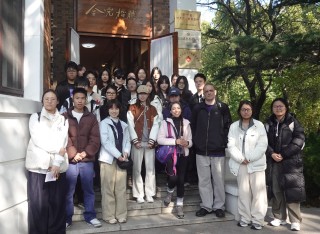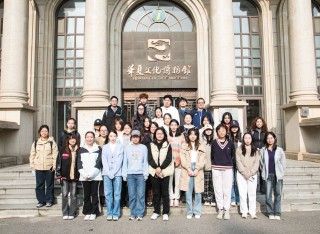
Dr Dan Knox
Academic and research departments
Surrey International Institute at Dongbei University of Finance and Economics (SII-DUFE).About
University roles and responsibilities
- Director of Department of Accounting, Finance and International Tourism Management
- Programme Director: BSc (Hons) International Tourism Management
- Programme Director: BSc (Hons) Accounting and Finance
ResearchResearch interests
My research interests focus on cultural tourism, national identities, visual culture, tourism and embodied practice and experience. Particular topics of current interest include emotional responses to leisure activities, Chinese heritage cultures, and the nature of experience. My research is critically informed through a long-term engagement with social science methodologies and particularly cultural geography. My PhD thesis (University of Durham) focused on the role of festivals and cultural events in the promotion of regional and national identities in Aberdeenshire, Scotland,. I am particularly interested in the development of theory in the field of tourism studies as well as practical applications of theory in tourism contexts.
Research interests
My research interests focus on cultural tourism, national identities, visual culture, tourism and embodied practice and experience. Particular topics of current interest include emotional responses to leisure activities, Chinese heritage cultures, and the nature of experience. My research is critically informed through a long-term engagement with social science methodologies and particularly cultural geography. My PhD thesis (University of Durham) focused on the role of festivals and cultural events in the promotion of regional and national identities in Aberdeenshire, Scotland,. I am particularly interested in the development of theory in the field of tourism studies as well as practical applications of theory in tourism contexts.
Supervision
Postgraduate research supervision
I am currently supervising two UK-based PhD students and am open to discussion concerning further supervisions. Topics I am currently supervising include social media practices and identity at music festivals and disabled family experiences at theme parks in the UK.
Teaching
MAN2192 Applied Tourism Project
MAN3161 Dissertation
MAN3212 Digital Events Management
Publications
Purpose The purpose of this paper is to examine the impact of the five dimensions of service quality on customer satisfaction in the UK fast food market and to indicate which factors among the five dimensions have a main role in driving overall customer satisfaction. Design/methodology/approach Primary data in the form of 147 questionnaire responses were been collected from a variety of quick service fast food restaurants in the UK. Likert seven-point rating scales were used to structure the questionnaire. Data were collected from the customers at two KFC restaurants, two McDonald’s restaurants, and one Burger King Restaurant. Findings The results of the analysis indicate that tangibles, responsiveness and assurance play the most important role in driving customer satisfaction in the UK fast food industry, followed by reliability and empathy. Results of correlation and regression analysis show that physical attributes (tangible) of service quality are key to customer satisfaction. In a nutshell, the tangibles variable is the most important factor driving customer satisfaction in the context of the UK fast food market. Originality/value This research incorporates unique and original insights in relation to the British fast food restaurants market and the results constitute novel findings pertaining to the importance of physical facilities and attributes. This account of the relative importance of service quality dimensions in fast food restaurants in the UK adds value to the field. The findings of this research have contributed to a better understanding of the main factors that influence service quality and customer satisfaction and have implications from a managerial point of view in the highly competitive UK fast food and wider foodservice industry.
The focus of this paper is on the practices and processes of joint action and knowledge, the performativity of language and the tracing of how particular items of rhetoric move, solidify and change. The paper illustrates the contingent factors that give language and practice variable meanings through an examination of the Doric dialect and culture of north-eastern Scotland. Doric has, in recent years, been increasingly discussed and debated by the press and the academy. Here, it is argued that the continued reproduction of 'north-easterness' is related to the ways in which dialect and culture have been mobilized, politicized and legitimized through the erection and operation of an institutional framework. The role of 'expert' and enthusiast knowledges in the propagation of cultural trends is analysed, contrasting the existence of north-eastern tradition as an allegedly 'organic' culture, when dialect use and 'traditional' practices were unproblematic and everyday, with contemporary institutionalized 'north-easterness'. This is achieved through an exploration of the spectacularization of tradition, unpacking some of the tensions this creates with regard to the Bothy Ballad and literary traditions of the north-east.
Purpose - The purpose of this paper is to investigate the service quality of full-service restaurants in Vietnam to explore possible factors that may impact customer perception, which subsequently influences customer satisfaction and behavioural intentions. Based on the DINESERV model and service clues, the possible dimensions to construct customer perception were realised, and four key dimensions were suggested. Design/methodology/approach - Data were collected from four urban local full-service restaurants in Vietnam, and factor analysis and SEM-PLS were then performed to uncover the relationship between customer perception, satisfaction and behavioural intentions. Findings - The results suggest that customer perception significantly influences customer satisfaction and behavioural intentions, and customer satisfaction itself is also found to have influence on behavioural intentions. Originality/value - This is an original piece of work which contributes to the exploration of service quality in developing countries and to the incorporation of cleanliness into analyses of restaurant service quality in particular.
Increasing numbers of researchers in the field of tourism studies are using discourse analysis as a means of critical investigation when faced with qualitative or textual forms of data, such as written documents, or visual materials such as photographs and brochures. Such data is often representative of how a group of people have made sense of and reflected on their own world and that of others. However, there are many different types of discourse analysis and many different ways in which discourse analysis has been deployed. This paper reviews the attempts of tourism scholars so far and argues that many researchers have utilized discourse analysis in an eclectic fashion. The paper thus differentiates between content analysis, simple textual analysis, semiotic analysis and post-structuralist forms of discourse analysis in order to provide a framework for other tourism researchers to use. In particular, it is argued that discourse analysis should proceed by recognizing that all texts are produced intertextually in relation to other texts, which are in turn embedded within power relations that give degrees of authority. Discourse analysis should thus treat texts as mediated cultural products which are part of wider systems of knowledge. It is argued that discourse analysis is not just interested in what is within the text itself but also in what has been left out and the 'secret' meanings that are not obvious. It is also argued that it is important to note the interruptions and disruptions that occur within the flow of qualitative data. Utilizing discourse analysis should mean the development of a more nuanced reading of the data and thus add a more critical edge to much tourism research.
Understanding Tourism introduces tourism students to concepts drawn from critical theory, cultural studies and the social sciences. It does so with a light and readable touch, highlighting the ideas that underlie contemporary critical tourism studies in a practical and engaging way.Specifically, the authors examine how post-structuralist thought has led to a re-imagining of power relationships and the ways in which they are central to the production and consumption of tourism experiences.Eleven clear, relevant chapters provide an accessible introduction to tourism defining, explaining and developing the key issues and methods in this exciting field.These topics include:Regulating Tourism; Commodifying Tourism; Embodying Tourism; Performing Tourism; Tourism and the Everyday; Tourism and the Other; Tourism and the Environment; Tourism and the Past; Tourism Mobilities; Researching TourismA strong teaching text, this will be well received by lecturers seeking an authoritative, multi-disciplinary book on contemporary tourism and by students who want a practical, grounded introduction which understands their learning and research needs.
Purpose - The purpose of this paper is to utilise commodification for the conservation and promotion of cultural heritage in cities by developing interpretative strategies, specifically enabling access to intangible cultural heritage through its tangible parts. Design/methodology/approach - In total, three case studies were conducted in the cities of Amsterdam, Genoa and Leipzig, through a workshop cycle with destination and local tourism stakeholders and citizen representatives, to develop interpretative strategies for the cities. Findings - The paper identifies tangible and intangible cultural heritage of the three cities, and integrates them into stories and outlines the development of an interpretative strategy for destinations independent from, but aligned with, the current marketing and positioning strategy development level. Research limitations/implications - Future research should examine the integration process of interpretative strategies and heritage interpretation of cultural heritage in marketing strategies, and in particular focus on the intangible aspects. Originality/value - The article integrates and highlights the value of intangible cultural heritage and interpretation of cultural heritage in general for marketing purposes through the development of an interpretative strategy improving access to destinations' cultural heritage supporting destination management. The article adds to the research discussion of the commodification of cultural heritage.
This paper applies the SERVQUAL model for the purpose of examining the impacts of the five dimensions of service quality on customer satisfaction and customer loyalty in the hotel industry in Malaysia, and to investigate which factors among said dimensions (tangibles, reliability, responsiveness, assurance and empathy) have a major role in affecting customer satisfaction and loyalty in relation to resort hotels. Questionnaires were used to collect quantitative data for this research by deploying a random sampling strategy to invite 136 hotel guests to complete the survey. The key findings indicate that empathy, tangibles and reliability have significant roles in affecting overall customer satisfaction in the Malaysian resort hotel sector but that responsiveness and assurance were not significantly influential. Empathy was the most significant predictor of customer satisfaction among all of the dimensions, and customer satisfaction has a positive relationship with customer loyalty in this context.
This paper explores the heritage, changing nature, and re-inscription of traditional practices. It highlights the processes through which Scottish song traditions have moved from being everyday, unremarkable practice to public spectacle and tourism performance. An historically grounded analysis of contemporary folk festivals and events in Aberdeenshire demonstrates how the content of folksong has become ever more fixed at the same time as performances have been re-signified to represent the region to both locals and tourists. The paper also traces out the processes of the spectacularization of tradition and the movement of individual songs from agricultural landscapes, through field, archive, and edited collection to contemporary folk festival and public display. Tradition spectaculaire: la chanson folklorique écossaise et l’authenticité. Cet article examine l’héritage, la nature changeante et la réinscription des pratiques traditionnelles. Il souligne les processus par lesquels les traditions de la chanson écossaise ont passé pour qu’une pratique quotidienne sans rien de remarquable devienne spectacle public et interprétation touristique. Une analyse fondée sur l’histoire des festivals folkloriques contemporains et des manifestations du comté d’Aberdeen démontre comment le contenu de la chanson folklorique est devenu de plus en plus fixe au même temps que les interprétations ont été re-signifiées pour représenter la région aux habitants et aux touristes. L’article trace aussi les processus de la spectacularisation de la tradition et le mouvement des chansons individuelles des paysages agricoles; aux collections sur le terrain, d’archives et édités ; aux festivals folkloriques contemporains et aux spectacles publics.
The purpose of this study is to identify risk issues in managing active sport tourism event projects in China from the perspective of event managers. A qualitative method was utilized, with 12 semi-structured interviews being conducted in China in order to achieve the research objectives. A key finding is that ten risk issue categories were identified: safety, financial, environmental, technical equipment, operations, human resources, political, legal, tourist behavioral, and relationships. Among these categories, the issues can be further divided into two groups focused around, firstly, 'contributing risk' which directly leads to the occurrence of the second 'primary risk' category. The second finding uncovers the impacts of these risk issues as well as the interaction between them. Furthermore, another finding reveals distinctions of risk issues in different types of sport tourism event projects in China. This research contributes to the development of systematic understanding of categories and management of risk in active sport tourism from the perspective of managers, and will be useful in developing consensus in both the Chinese and international sport tourism industries.
The spectral geography of the colonial legacy in Bristol is marked by a series of absences from official and tourist narratives about the city. The people and practices of the Atlantic slave trade are part of the historical and contemporary fabric of the city and persist as ever-present spectres. There are significant differences of view that agree with little beyond that the city was a major port of Empire and a significant site in the triangular trade. Bristol is commonly portrayed as a multicultural city with a rebellious spirit and a strong commitment to social justice. This urban imaginary is evident in accounts of the removal of a statue of Edward Colston, a slave trader and philanthropist, during a Black Lives Matter rally in 2020. The now empty plinth of the Colston statue has become a contested, liminal space that sits between disparate interpretations and radically different points in time in terms of social relations. Individual and collective memories and stories about slavery constitute hauntings in a spectral geography of Bristol. Such stories are rarely heard, and the city is thus haunted by the absences of the voices of those enslaved and a lack of knowledge of the role of slavery in the growth and historic prosperity of the city. Little has been done to incorporate such dissonant heritage and so the histories of slavers, slavery, and slaves are not significant themes in tourism marketing, attractions or experiences in the city. This paper demonstrates that a process of coming to terms with difficult heritage and associated hauntings offers significant potential for tourism to contribute to historic and contemporary social justice.

